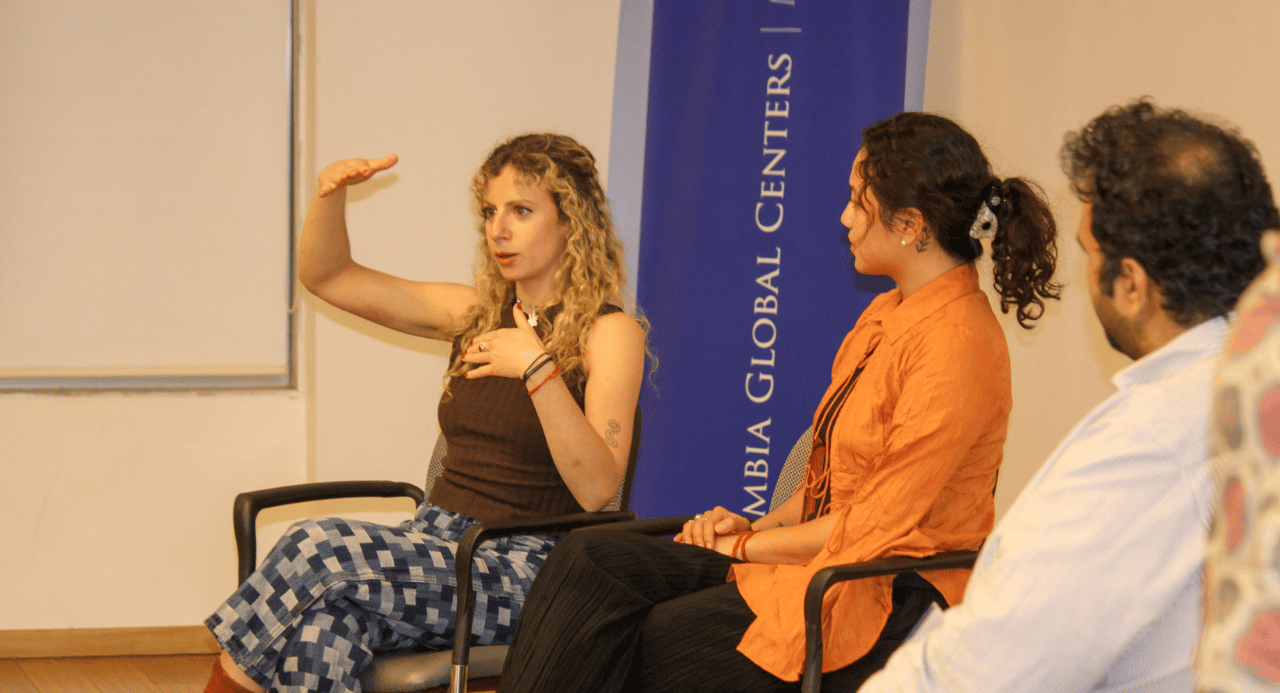Reflections on Sustainable Design

Beneath our feet lies a complex network of soil, teeming with life and diversity. The communal earth represents an intricate web interconnecting everything, from humans and animals to other life forms. Despite this, we often perceive land as divided by imaginary lines—boundaries that separate us based on social status, class, knowledge, and more. To challenge and reflect upon this division, Columbia Global Center Mumbai hosted a panel discussion on January 8th, 2024, featuring the Natural Materials Lab team from Columbia University’s Graduate School of Architecture, Planning, and Preservation (GSAPP).
The event was centered around the team's ceramic installation, 'Reflection of Transcorporeal Feminism.' Panelists Lola Ben-Alon, Assistant Professor at GSAPP, Penmai Chongtoua, Faculty Researcher at the Natural Materials Lab, and Sasha Fishman, Sculpture MFA candidate at Columbia University, articulated that the artwork sought to showcase the relationship we share with the ground beneath us—both symbolically and literally. Architect Jay Shah (GSAPP, ‘09). Director of Access Architects, moderated the discussion, which dwelt upon the inception and journey of creating the installation, the ideation process and underlying philosophies, and the role and challenges associated with sustainable design.
Drawing upon Astrida Neimanis's notion of hydrofeminism, which suggests that we are inherently linked to the watery planet due to our composition, Ms. Chongtoua explained that this philosophy influenced their artwork—a fusion of figurines and water systems. The team found significant inspiration in India's religious context, particularly the tradition of crafting clay idols of Goddess Durga during the Durga Puja festival celebrated in West Bengal. Through interactions with sculptors and designers in India, Penmai reflected on how "figurines were an embodiment of the growth and expansion that humans undergo through deep thinking that can be communicated through the form of soil and water." The installation also displayed a continuous flow of water, representative of ancient stepwells in India.
The team encountered difficulties utilizing water-retaining materials and creating the desired water flow to restore energy through movement in the fountain-structured installation. Ms. Fishman elaborated on their struggles with organic materials and the challenges arising from their refusal to use plastic. She also shared her unforgettable experience of working on the project at their production residency Art Ichol located in Mahair, Madhya Pradesh.
The discussion served as a reminder of the importance of rethinking our relationship with the environment and each other, transcending boundaries, and fostering a deeper understanding of our shared existence. Throughout the discussion, attendees had an opportunity to reflect upon the connection between humanity, the earth, and the flow of water. Participants also raised insightful questions about sustainable design and materials used in modern architectural structures. ‘Reflections of Transcorporeal Feminism’, the soil-based installation was a response to an open call, “Common Ground - A metaphorical and literal exploration of the ground upon which we meet”, curated by the Indian Ceramics Triennale 2024: Common Ground, and showcased in the triennale’s opening on January 19th in New Delhi.